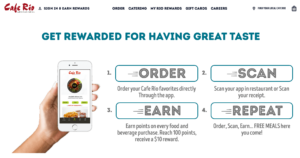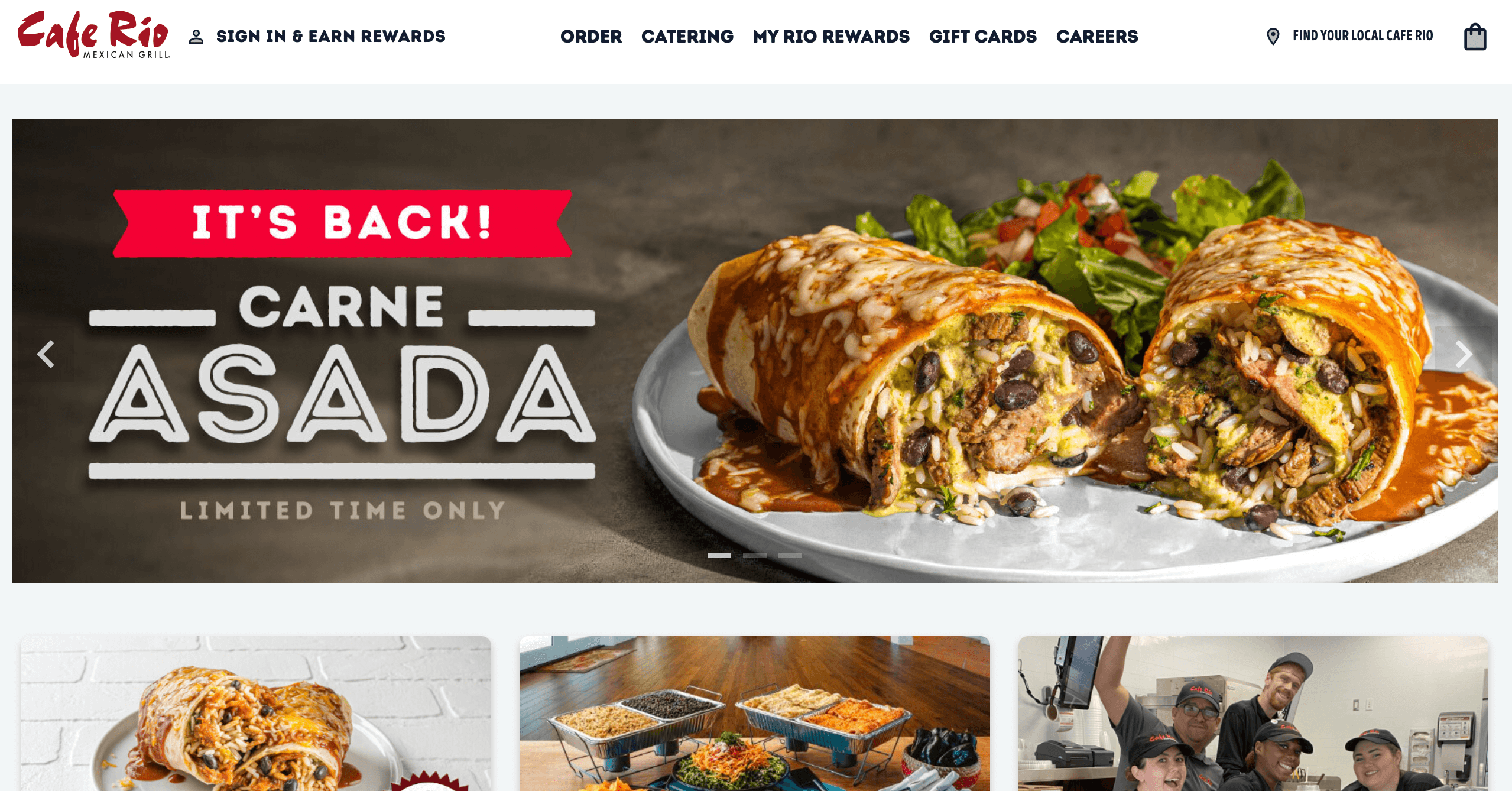Cafe Rio Mexican Grill started in southern Utah and has grown into a well-known Mexican food restaurant with over 150 locations throughout the United States. This Mexican grill is known for fresh, never frozen ingredients, delicious food, and a classic Tex-Mex aesthetic that makes you feel at home. The menu includes burritos, wraps, tortillas, enchiladas, tortilla chips, salsa and queso.
This restaurant offers franchising opportunities to the right investors, but is investing in Cafe Rio a win? This article covers everything about this Tex-Mex franchise, including the Cafe Rio vs. Costa Vida lawsuit. Here, we discuss the costs, fees, and challenges of running a Cafe Rio location. To be matched with a franchise opportunity that matches your interests and budget, take our 7-minute quiz.
Page Contents
- What Is Cafe Rio?
- Franchise Facts
- Is Cafe Rio Mormon Owned?
- Is Cafe Rio bigger than Costa Vida?
- Who Owns Cafe Rio?
- Financial Requirements and Fees
- Additional Fees
- Average Sales / Revenue per Year
- How Much Profit Do Cafe Rio Franchisees Make Per Year?
- Advantages of Cafe Rio
- Challenges of Cafe Rio
- Is Cafe Rio Right for You?
What Is Cafe Rio?
Cafe Rio is a Text-Mex restaurant focusing on Northern Mexico and Southern Texas recipes with some of the surrounding area’s distinct flavors for good measure. This chain started in 1997 by founders Steve and Patricia Stanley. The couple committed themselves to provide authentic, high-quality food, and that commitment has held strong ever since.
While Cafe Rio came under new owners in 2004 and changed hands several times in the following years, their commitment to fresh food remained the same. Recipes are prepared daily, meaning there’s no frozen, reheated or pre-made food at this Mexican Grill.
Franchise Facts
Cafe Rio may have started in Utah, but this restaurant has expanded to 157 locations since December 2022, with several restaurants making their way to the East Coast. Utah still boasts the most restaurants at 49, but Arizona comes in at a close second with 46.
Franchise Facts
| Year Founded: | 1997 |
| Total Units: | 157 |
| Industry: | Food and Beverage |
Is Cafe Rio Mormon Owned?
Because Cafe Rio is a franchise, the odds of an individual location being owned and run by members of The Church of Jesus Christ of Latter-Day Saints (LDS Church or Mormon Church, more commonly) is relatively high. While the business does have roots in Utah, it does not disclose any ties directly to the LDS Church, nor does its newest owner, Freeman Spogli & Co., disclose any LDS Church affiliations.
While one founder of Freeman Spogli & Co. has been a fundraiser for conservative political groups over the years this does not mean the company is closely affiliated with the Mormon Church. There are currently no direct ties between the LDS church and Cafe Rio that we can find other than its location in Utah and popularity among the locals, which is a purely tangential connection at best.
Is Cafe Rio bigger than Costa Vida?
Cafe Rio and Costa Vida got their start in Utah within six years of each other, with Cafe Rio opening in 1997 while Costa Vida opened in 2003. While one could argue whether or not these restaurants serves truly authentic Tex-Mex cuisine, their disagreements came to a head in 2005. First, cafe Rio sued Costa Vida (then Costa Azul) for everything from recipe theft and layout stealing to diner card concept theft. While the companies settled the lawsuit privately, this drummed up the concept of a rivalry between the two restaurants that carry on locally through their customer base.
Costa Vida is a slightly smaller franchise than Cafe Rio, with only 100 locations. While both restaurants offer Mexican-styled food, Costa Vida lives up to its name and leans toward a beach aesthetic, offering tropical drinks alongside classic Tex-Mex meals. Meanwhile, Cafe Rio sticks more to a Rex-Mex aesthetic through and through, focusing on burritos and wraps.
In general, the two franchises are of comparable size and popularity in Utah, and the competition stems from them occupying the same food and beverage niche.
Who Owns Cafe Rio?
While the former president of Burger King bought Cafe Rio’s original 6 locations, turning it into the franchise we know today, Burger King does not own the franchise. Instead, Cafe Rio’s majority shareholder as of 2016 is Freeman Spogli & Co., a private equity firm. But, of course, since many locations are part of franchise agreements, individual franchise locations are owned and operated by franchisees.
Freeman Spogli & Co. does not own Burger King but has held stock in other large companies, including PETCO and El Pollo Loco. Cafe Rio was not the first restaurant acquired by this equity firm and is unlikely to be the last, as the company has an impressive list of investments.
Financial Requirements and Fees
Now that we’ve covered the basics of Cafe Rio let’s dive into the financial requirements and fees associated with franchising one of their locations. Keep in mind that Cafe Rio does not just provide this information to non-franchise applicants, so it’s a good idea to review the updated terms before making any financial agreement or signing a contract.
Let’s cover the base financial requirements, fees, and average investments that go into starting a Cafe Rio from the ground up.
Financial Requirements
| Liquid Capital: | N/A |
| Net Worth: | N/A |
| Total Investment: | $659,500 to $1,025,000 |
| Franchise Fee: | $30,000 |
Because Cafe Rio is not forthcoming about their franchise agreement to non-franchisees, the list of requirements for franchise approval is limited. While the liquid capital and net worth required to start a Cafe Rio location are unknown, the average cost of creating a single restaurant is between $659,500 to $1,025,000. This fee includes the $30,000 franchise fee, which is about the average for restaurants in this category.
Remember that the total investment depends mainly on external factors and may not include things like real estate purchase and approval or furnishings and signage for each location. When approaching franchise costs, it’s best to estimate higher rather than lower for initial investments, as this allows for a margin of safety on either side of your initial investment.
Additional Fees
| Advertisement Fee: | 2% |
| Royalty Fee: | 6% |
As noted above, Cafe Rio does not provide information on their franchise fees to non-approved investors, meaning there are likely more fees than the standard advertisement and royalty fee. Generally, 5% to 7% is a typical royalty fee for a restaurant franchise, putting Cafe Rio securely in the middle. However, remember that the 2% additional advertisement fee brings this total percentage to 8% of total profits. While advertising benefits your business, this can significantly impact your bottom line.
You should expect additional fees for a point of sale system (POS), training, materials, inventory requirements, and yearly conventions, should the agreement require these items. While concrete numbers on these topics are not available for Cafe Rio, they are common among franchises, especially restaurant franchises, and are worth considering in your final budget.
Average Sales / Revenue per Year
| Systemwide Annual Sales: | $273,000,000 in 2020 |
| Average Annual Sales per Unit: | $2,000,000 in 2017 |
| Average Franchisee Profit: | N/A |
Because there is not more information to work with, we cannot directly compare the cost-benefits of starting a Cafe Rio. However, a quick look at their average annual sales and revenue can give some insight into the company. In an interview in 2022, Cafe Rio CEO Steve Vaughan noted that 20% of the company’s sales come from digital orders, outlining the importance of their to-go and order online features.
\The most up-to-date profit report for the company is from 2020 and lists profits at over $273 million. For comparison, in 2021, Costa Vida made only $112 million in profits. So while a direct competition comparison puts Cafe Rio ahead, without more information about the average yearly cost of owning and operating a Cafe Rio location, it’s hard to make a definite statement on the investment worth of a Cafe Rio location.
You Might Like: How to Understand the Total El Pollo Loco Franchise Cost?
Investors looking into this franchise should review all terms and conditions closely and take the time to calculate each location’s average cost and profit depending on their age, popularity, location, and local competition. The more financial information you have before investing in a franchise, the better you are prepared for the unexpected.
How Much Profit Do Cafe Rio Franchisees Make Per Year?

Cafe Rio has a rewards program.
While a rough estimate of annual sales per unit comes to $2 million or more in 2017 currency, since we don’t know every fee, we cannot calculate how much yearly profit each franchise owner makes. However, if we work off only the royalty and advertising fee and compare it to the annual unit sales, each unit sends $160,000 of its profits back to the franchise owner. This assumes the royalty and marketing fees are the only direct percentages sent back to the company.
Franchise Review: How Much Does it Really Cost (w/ Fees) to Open a KFC?
Of course, it is implausible the remaining money goes directly to the franchise owner. On top of this, the average profits for a franchise owner vary depending on the franchise, the age of the restaurant, and more external factors. With such limited information, it is difficult to tell if Cafe Rio is a fast turnaround investment or takes much longer to turn a profit, similar to our analysis of IHOP.
Advantages of Cafe Rio
Some of the advantages of franchising with Cafe Rio include the following:
- Fresh Ingredients: Cafe Rio prioritizes high-quality food, meaning customer satisfaction is one of its top priorities. This quality promise likely indicates their suppliers are well-vetted, which is a real plus for any restaurant owner.
- Brand Popularity: Cafe Rio is incredibly popular in Utah and the surrounding states, meaning the brand carries its recognition to new locations. While not every location has the same pull, Cafe Rio’s brand identity packs weight in the Tex-Mex industry.
- Local Rivalry: While there is such thing as bad press, Cafe Rio vs. Costa Vida carries on as a local debate about the best place to get Mexican food. By playing off this friendly competition, Cafe Rio continues to outpace Costa Vida in gross sales numbers, meaning the competition is not hurting their profits.
- Average Royalty Fees: Although there is no direct information about other fees associated with franchising a Cafe Rio location, the 6% royalty fee is well within the averages for this franchise, meaning you’re not spending an excessive sum on royalties right out the gate.
Challenges of Cafe Rio
Cafe Rio comes with its challenges as a franchise option, including:
- Limited Information: Even with a wealth of online information about the company, Cafe Rio is quite guarded about their franchisee requirements. From liquid funds and net worth to hidden fees and additional costs, there’s a void of information that could determine if this franchise is worth the investment.
- Local Appeal: Cafe Rio performs well in its home territory. However, setting up a new Cafe Rio in Utah increases competition within the brand, and moving out to another state means less customer power to jumpstart a new franchise location. So while the local appeal has its upsides, it may effectively limit new restaurant locations.
- Fresh Recipes: While fresh ingredients and fresh recipes sound like a fantastic promise, that means that every member of your team needs to know how to prepare basic recipes, and if you run out during a rush, you have to make the ingredients from scratch, no stored backups or frozen chicken to save you during the lunch rush. This can stress franchisees with limited restaurant experience or those used to shelf-stable inventory associated with quick-service restaurants.
Is Cafe Rio Right for You?
While Cafe Rio may boast brand identity in Utah and the surrounding areas, the restaurant lacks concrete information for potential franchisees. However, the information provided does show average costs compared to other restaurants in the same category. Still, without accurate information on costs, fees, and average annual franchisee profits, it’s difficult to assess the value of a Cafe Rio location.
As with any franchise, investment requires research. With Cafe Rio, the best course of action is to read the terms of their latest franchise agreement closely and compare it with other franchises in the same niche, such as other restaurant franchises, with more information available.
Are you interested in learning more about franchising a restaurant or other business? Check out some other franchises like Taco John’s on our site to find out how Cafe Rio compares across the board.





